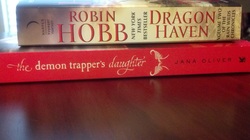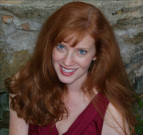
From August 31st to September 2nd, the Atlanta Journal and Constitution’s Seventh Annual Decatur Book Festival sprawled the expanse of Decatur’s historic square providing writers and readers a place to sell, buy, and learn.
Robin Hobb and Jana Oliver are two prolific writers of the Fantasy/Science Fiction genre who brought their latest work and wisdom to their talk “Flights of Fantasy.” The conversation covered the writing process, publishing, and trends in the book world in general.
Robin Hobb is the second pen name of Margaret Astrid Lindholm Ogden. She has written as Megan Lindholm as well. She lives and writes in Tacoma, Washington. Her more recent series include the Farseer Triology, the Liveship Traders Triology, the Tawny Man Trilogy, and the Rain Wilds Chronicles. She has been nominated for numerous awards (Hugo, Nebula, and Endeavor) and has won the Isaac Asimov Science Fiction Reader’s Award twice. Her latest work in the Rain Wilds Chronicles is City of Dragons.
Jana Oliver is an Iowa native who currently resides in Atlanta. She self-published her first three novels before selling the Time Rover Series to Dragon Moon Press in 2005. This series has won twelve awards. For her second series, The Demon Trappers, she signed with St. Martin’s Press. The fourth book in this Young Adult series, The Foretold, is due out in the U.S. in December of this year.
Both authors laughed about the interesting weekend they were having since they split their time between the community-based Decatur festival and DragonCon which is much like an otherworldly takeover of downtown Atlanta. As Oliver pointed out, DragonCon is its own little city. Hobb noted that the conference had over 52,000 attendees. She had to stand in line for the escalator.
This is a testament to the surge in popularity of the Fantasy/Science Fiction genre in recent years. Oliver and Hobb both credit society’s difficult times as a prominent reason for the change. Books continue to be one of the most inexpensive forms of entertainment. Hobb explains that you can look at Science Fiction sales over history and see this phenomenon. She lives near a military base and has noticed that many of the young soldiers are reading Science Fiction and Fantasy. Oliver points out when you open a Fantasy book you’re buying a ticket to go anywhere–you’re guaranteed an escape.
And in Oliver’s case, you’re sure to find demons. What led her to this storyline? She simply asked “what’s missing in this genre?” Her writing process involved researching sociology and culture as well as the various faiths of the world. Friends warned her about broaching the subject of religion. She found it fascinating and at one point found herself building “Hell’s organizational chart” as she created her world.
Hobb noted that there’s no wrong way of writing a book. She finds that a compelling storyline determines the world she creates. She loves all her characters, including the villains. Her writing schedule varies with each work, but she often knows the beginning and end of the story. The middle is important. She cautions about losing your reader, though. “When you look across a valley full of fog, you know your character has to get across to a far ridge.” She’s learned that sometimes it’s okay to write “three days later” rather than describe every mundane thing that happens to the character during the trip.
And how does Hobb not lose her way while creating her works? She keeps a glossary for herself as she goes along to aid with consistency. Also, a “go back” file helps to eliminate any gaps.
Oliver uses Scrivener as she develops her stories. She can utilize the corkboard feature in this software to pull scenes around. She always ends a scene or chapter with a cliff hanger or hook.
Hobb compares the writing process to a complicated weaving project. As an artist, you have to stay on top of things. You can’t just stop the process in the middle of weaving or you’ll lose your place. It’s obvious she follows this advice as her works are known for their intricate worlds and characters.
Fans in the audience expressed their appreciation for both author's amazing detail and world-building. As writers they both respect the writer-reader contract. “We have an agreement with our reader that we will take you somewhere you can’t get just stepping outside your door.” Hobb said. “In our books there are monsters, gods, and, of course, heroes.”
For more information about these authors, please visit:
http://www.janaoliver.com/
http://robinhobb.com/novels/

 RSS Feed
RSS Feed